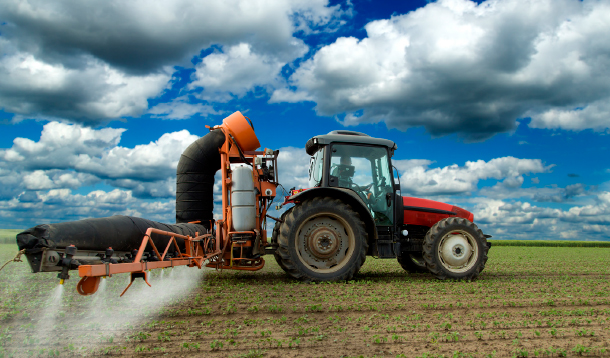What is a Pesticide?
A pesticide is a general term that refers to any agent: biological, chemical or physical that is designed to kill, harm, or at least retard the growth of pests. Pesticides are used to reduce or possibly eliminate the damage that can occur to crops or other vegetation by any number of pests such as bacteria, insects, weeds, fungus, bacteria, rodents, fish or any other troublesome creature. It may be on a small scale such as using hand sprayers in homes or gardens, or on a much larger scale such as when farmers using tractors or airplanes to deliver herbicides and /or insecticides to their field crops. In other words, we have all relied on pesticides at some time or another, directly or indirectly.
Dangers of Pesticides 
Practically all chemical pesticides are non-specific poisons. What kills one life form will most likely kill or harm another. Consider, for a moment, all of the ways in which we are exposed to pesticides.
Most chemical pesticides are very quick acting. None of them are harmless. Most reputable manufacturers of pesticides are very careful to issue strong warnings on their packing in this regards and advise about protecting fish, birds and pets as well as small children, and of course, ourselves.
We need to be mindful of long-term dangers as well as the immediate effect of such toxic chemicals. Rachel Carson wrote about this in her original book “Silent Spring” and her second book “Since Silent Spring”. These books were largely responsible for the banning of the chemical pesticide DDT, once used worldwide. Now it is banned for most purposes other than some commercial uses.
Pesticides in Drinking Water
Drinking water contaminated with pesticides is an ongoing problem for many people. “World pesticide expenditures totaled more than $35.8 billion in 2006 and more than $39.4 billion in 2007.” (Pesticide Industry Sales and Usage Report) Pesticides are found in a majority of U.S. households with 78 million out of the 105.5 million households indicating that they use some form of pesticide. With such widespread use by homeowners and farmers, it is easy to see how pesticides can seep into the water supply.
As of 2007, there were more than 1,055 active ingredients registered as pesticides, which yield over 20,000 pesticide products that are marketed in the United States. It may seem unbelievable, but one need only look at a typical garden center or hardware store. Pesticides can save gardeners and farmers money by preventing crop loss to insects and other pests. In the U.S., farmers get an estimated 400% return on money they spend on pesticides. A study conducted in 1999 found that a ban on pesticides in the United States may result in a rise of food prices, loss of jobs, and an increase in world hunger.
Not only are pesticides persistent in our bodies but also in nature. Because of the food chain, a pesticide that is intended for one life form may actually affect several different members of the food chain. Hence, the warning about eating fish from water that may be contaminated by pesticides and herbicides.
Most people are aware of the sharp demise of honey bees and other insects that act as pollinators for fruits, vegetables and other crops. This is one of the reasons why some pesticide companies are currently looking at the discontinuing several of their products. Hopefully, this will not be delayed as the action is long overdue.
Carbon Water Filters & Pesticides
Most pesticides are carbon based compounds or organic compounds. There is a principle in organic chemistry that carbon is strongly attracted to carbon and carbon compounds. This is the very basis for how carbon filters are able to absorb many light weight organic compounds, but even the best carbon filters and Reverse Osmosis systems cannot remove pesticides.
When organic compounds have molecules that are too large however, carbon filters can’t hold on to them. Fortunately these larger sized molecules also lead to higher boiling points for these chemicals.
 Remove Pesticides with a Water Distiller
Remove Pesticides with a Water Distiller
When the boiling points of these contaminants is greater than the boiling point of water, water distillation systems will readily remove them and leave them behind in the residue water. Distillation alone is a great way of removing most of these contaminants, including pesticides in drinking water. Combined with activated carbon post filters, 99.9% of most pesticides and herbicides will be removed from water. In fact, we recommend using distilled water to wash fruits and vegetables, to cook, make coffee or tea and to drink. In other words, distillation produces safe water that you can use for drinking and all of your consumable needs.